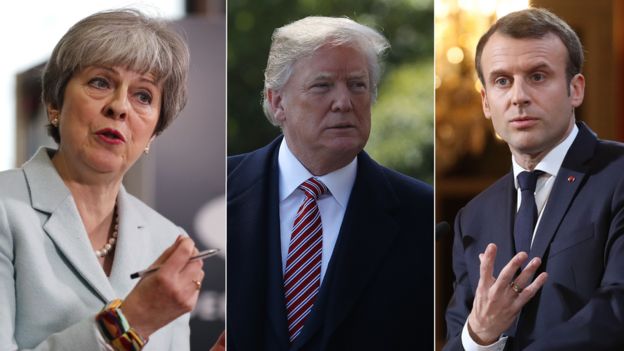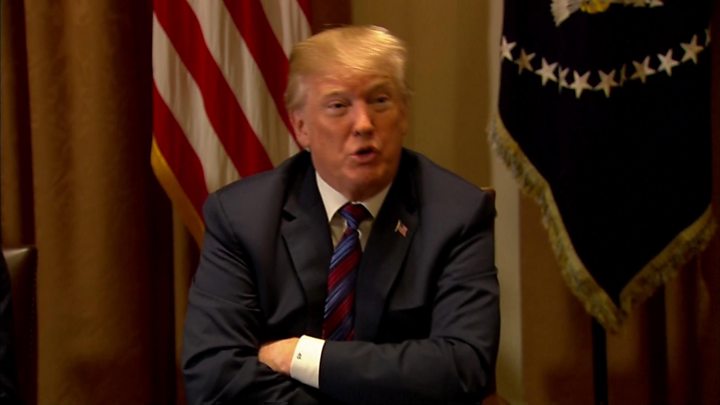Russia has warned the US that launching air strikes in response to a suspected chemical attack in Syria could spark a war between the two countries.
"The immediate priority is to avert the danger of war," Moscow's UN ambassador Vassily Nebenzia said on Thursday.
He accused Washington of putting international peace at risk and said the situation was "very dangerous".
Western powers are thought to be preparing for strikes but Russia, a Syrian ally, opposes such action.
"We cannot exclude any possibilities, unfortunately," Mr Nebenzia told reporters after a private meeting of the UN Security Council in New York.
He said there was a heightened "danger of escalation" because of the Russian military presence in Syria.
- What can Western military intervention achieve?
- Are we heading for a third world war?
- Syria 'chemical attack': What we know
- Firepower of key countries
Senior Russian figures, including the head of the military, have warned that US missiles will be shot down and their launch sites targeted if Russian personnel come under threat.
Mr Nebenzia also called for the UN Security Council to meet again on Friday to discuss the possibility of Western military action.
The White House says it is continuing to assess intelligence and talk to its allies on how to respond.
Meanwhile, the Organisation for the Prohibition of Chemical Weapons (OPCW) says experts are travelling to Syria and will start investigations on Saturday.
Why is the West considering military action?
 GETTY IMAGES
GETTY IMAGES
Opposition activists, rescue workers and medics say dozens of people died in a suspected chemical attack on the rebel-held town of Douma on Saturday.
President Bashar al-Assad's government - which receives military backing from Russia - denies any involvement and says reports of a chemical attack are "fabricated".
But the Violations Documentation Center (VDC), which records alleged violations of international law in Syria, said bodies were found with oral foaming, cyanosis, and corneal burns.
On Thursday, US officials were quoted as saying that samples from victims had tested positive for chlorine and a nerve agent.
Similarly, French President Emmanuel Macron said he had "proof" that the Syrian government had attacked Douma with chemical weapons, without giving further details.
In the UK, cabinet ministers agreed that it was "highly likely" the Assad regime was responsible for the alleged attack and said the use of chemical weapons must not "go unchallenged"
During a phone call late on Thursday, UK Prime Minister Theresa May and US President Donald Trump agreed on the need to deter chemical weapon use in Syria.
They agreed to "keep working closely" on the issue, Mrs May's office said in a statement.
What has Trump said about the attack?

On Sunday, the day after the attack, the US president said Russian President Vladimir Putin bore responsibility for the "atrocity" in rebel-held Douma, because of his support for the Syrian government.
Mr Trump, who has cancelled a planned trip abroad, has been canvassing support for strikes from the leaders of France and the UK.
On Wednesday he said the missiles were "coming", but on Thursday he tweeted that he had "never said when". It "could be very soon or not so soon at all", he said.
He later told reporters at the White House: "We're having a meeting today on Syria... We have to make some further decisions. So they'll be made fairly soon."
Also on Thursday, US Secretary of Defence Jim Mattis told a congressional panel: "I believe there was a chemical attack and we are looking for the actual evidence."
What is Russia's position?
Russia has described the reports of a chemical attack as a "provocation" designed to justify Western intervention.
President Vladimir Putin said on Wednesday that he hoped common sense would prevail and that the situation would stabilise.
He added that Russia would "keep all its international obligations in full".

